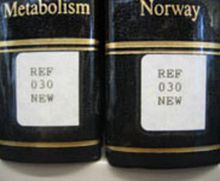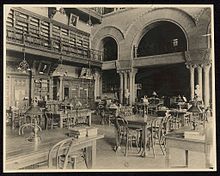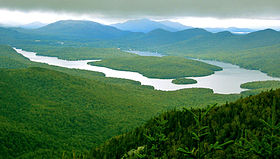- Melvil Dewey
-
Melvil Dewey 
Melvil DeweyBorn Melville Louis Kossuth Dewey
December 10, 1851
Adams Center, New YorkDied December 26, 1931 (aged 80)
Lake Placid, FloridaNationality American Education Amherst College Occupation librarian, resort developer, reformer Known for Dewey Decimal Classification Religion Christian Spouse Annie R. Godfrey (1878)
Emily McKay Beal (1924)Relatives Godfrey Dewey (son) Signature 
Melville Louis Kossuth (Melvil) Dewey (December 10, 1851 – December 26, 1931) was an American librarian and educator, inventor of the Dewey Decimal system of library classification, and a founder of the Lake Placid Club.
Contents
Education and personal life
Dewey was born in Adams Center, New York, the fifth and last child of Joel and Eliza Greene Dewey. He attended rural schools and determined early that his destiny was to be a reformer in educating the masses. At Amherst College he belonged to Delta Kappa Epsilon, earning a bachelor's degree in 1874 and a master's in 1877.
While still a student, he founded the Library Bureau which sold high quality index cards and filing cabinets, and established the standard dimensions for catalog cards.[1]
From 1883 to 1888 he was chief librarian at Columbia University, from 1888 to 1906 director of the New York State Library, and from 1888 to 1900 secretary and executive officer of the University of the State of New York. In 1895 Dewey founded the Lake Placid Club with his wife Annie. He and his son Godfrey had been active in arranging the Winter Olympics which took place at Lake Placid — he was chairman of the New York State Winter Olympics Committee. In 1926 he went to Florida to establish a new branch of the Lake Placid Club. He died in Lake Placid, Florida.[2]
Even Dewey's friends found his personality difficult, and he early in life established a pattern of making powerful enemies.[3] As one biographer put it, "Although he did not lack friends, they were becoming weary of coming to his defense, so endless a process it had become.”[4] He was removed from his position as New York State Librarian during a controversy over policies he had instituted at the Lake Placid Club restricting membership based on race and religion.[5] Another biography refers to Dewey's "old nemesis—a persistent inability to control himself around women" as an ongoing cause of trouble on the job.[6]
Dewey had been married (in turn) to Annie R. Godfrey and Emily McKay Beal[2] He was a member of the American Library Association's Hall of Fame.
Work
Dewey was a pioneer of American librarianship[7] and an influential factor in the development of libraries in America in the beginning of the 20th century.[8] He is best known for the decimal classification system that is used in most public and school libraries. But the decimal system was just one of a long list of innovations. Among them was the idea of the state library as controller of school and public library services within a state.[9] Dewey is also known for the creation of hanging vertical files, which first introduced at the Columbian Exposition of 1893 in Chicago.[10] In Boston, Massachusetts, he founded the Library Bureau, a private company "for the definite purpose of furnishing libraries with equipment and supplies of unvarying correctness and reliability."[11]
Dewey Decimal Classification
 Spine Books Label show Call Number for Dewey Decimal Classification.
Spine Books Label show Call Number for Dewey Decimal Classification. See also: Dewey Decimal Classification
See also: Dewey Decimal ClassificationImmediately after receiving his undergraduate degree he was hired to manage Amherst's library and reclassify its collections. Dewey worked out a new scheme that superimposed a system of decimal numbers on a structure of knowledge first outlined by Sir Francis Bacon.[12]
Dewey copyrighted the system in 1876. This system has proved to be enormously influential; though many American libraries have since adopted the classification scheme of the Library of Congress, Dewey's system remains in widespread use.[citation needed]
American Library Association
In 1877 Dewey moved to Boston, where he founded and became editor of The Library Journal, which became an influential factor in the development of libraries in America, and in the reform of their administration. He was also one of the founders of the American Library Association, of which he was secretary from 1876 to 1891, and president in 1891 and 1893.[8]
School of Library Economy
 Interior of the New York State Library, late 19th century.
Interior of the New York State Library, late 19th century.
In 1883 Dewey became librarian of Columbia College, and in the fol lowing year founded there the School of Library Economy, the first institution for the instruction of librarians ever organized. This school, which was very successful, was removed to Albany in 1890, where it was re-established as the State Library School under his direction.[8]
During the period from 1888 to 1906 Dewey was also director of the New York State Library, and until 1900 he was secretary of the University of the State of New York as well. In that function he completely reorganized the state library, making it one of the most efficient in America, as well as established the system of state travelling libraries and picture collections. In 1885, he founded the New York Library Club there.[11]
Metric system advocacy
As an enthusiastic supporter of the metric system, Dewey established the American Metric Bureau.[13] Dewey also served once again as its secretary.[14]
Lake Placid Club and spelling reform
Late in his life Dewey helped found the Lake Placid Club as a health resort. His theories of spelling reform (to which end he founded the Spelling Reform Association in 1886)[11] found some local success at Lake Placid: there is an "Adirondac Loj" in the area, and dinner menus of the club featured his spelling reform. A September 1927 menu is headed "Simpler spelin" and features dishes like Hadok, Poted beef with noodls, Parsli or Masht potato, Butr, Steamd rys, Letis, and Ys cream. It also advises guests that "All shud see the butiful after-glo on mountains to the east just befor sunset. Fyn vu from Golfhous porch."
Dewey was an early promoter of winter sports in Lake Placid and was active in arranging the 1932 Winter Olympics there. He also was a founder of the Lake Placid Club Education Foundation in 1922. Under his leadership the Northwood School (Lake Placid, New York) prospered. He was also a founder of the Adirondack Music Festival in 1925, and served as a trustee of the Chautauqua Institution.
In 1926 he established a southern branch of the Lake Placid Club in Florida. Dewey was the proponent of Lake Stearns in Florida formally changing its name to Lake Placid, Florida.
Selected publications
- 1876 Classification and subject index for cataloguing and arranging the books and pamphlets of a library. Hartford, Conn.: Case, Lockwood, & Brainard Company (44 pages).
- 1885 Decimal classification and relative index for arranging, cataloguing, and indexing public and private libraries and for pamphlets, clippings, notes, scrap books, index rerums, etc.: Second edition, revised and greatly enlarged. Boston: Library Bureau (314 pages).
- 1886 Librarianship as a profession for college-bred women. An address delivered before the Association of collegiate alumnæ, on March 13, 1886, by Melvil Dewey. Boston: Library Bureau.
- 1887 Library notes: improved methods and labor-savers for librarians, readers and writers. Boston: Library Bureau.
- 1895 Abridged decimal classification and relative index for libraries. Boston: Library Bureau.
- 1898 Simplified library school rules. Boston, London [etc.]: Library Bureau.
- 1889 Libraries as related to the educational work of the state. Albany.
- 1890 Statistics of libraries in the state of New York numbering over 300 volumes. Albany.
- 1894 Library school rules: 1. Card catalog rules; 2. Accession book rules; 3. Shelf list rules.
- 1904 A.L.A. catalog. Washington: Government Printing Office.
See also
- Public Library Advocacy
- History of Public Library Advocacy
References
 This article incorporates text from a publication now in the public domain: Chisholm, Hugh, ed (1911). Encyclopædia Britannica (11th ed.). Cambridge University Press.
This article incorporates text from a publication now in the public domain: Chisholm, Hugh, ed (1911). Encyclopædia Britannica (11th ed.). Cambridge University Press.
- ^ Michael Dewe (1968) "Historical aspects of library supply". In: Library world Vol 70–72 Grafton (eds.) p.27–28
- ^ a b The New York Times. "Melvil Dewey dead in Florida", December 28, 1931.
- ^ Wiegand, passim
- ^ Rider, Fremont. (1944) Melvil Dewey. American Library Association. p.105.
- ^ Wiegand, p. 327
- ^ Wiegand, p.353–5ff.
- ^ Weigand, Wayne A. and Donald G. Davis (1994). Encyclopedia of Library History. Taylor & Francis, p388. ISBN 0-8240-5787-2
- ^ a b c "DEWEY, MELVIL (1851–)" in: Encyclopædia Britannica (Eleventh ed.). Chisholm, Hugh, ed (1911). . Cambridge University Press.
- ^ Jim Scheppke, State Librarian (2005). Origins of the Oregon State Library. Written on the occasion of the celebration of the State Library Centennial, January 27, 2005 Retrieved 30 June 2008.
- ^ Erik Larson (2003). Devil in the White City.
- ^ a b c {{cite web|accessdate=2011-07-04|title=Library Bureay - Our Legacy|url=http://www.librarybureau.com/aboutlegacy.html
- ^ W.A. Wiegand (1998). "The "Amherst Method" : The Origins of the Dewey Decimal Classification Scheme" In: Libraries & Culture. Vol. 33, No. 2, Spring 1998.
- ^ The Library History Buff. " Melvil Dewey's Library Bureau".
- ^ Children of the Code. " Background Research Notes: CODE REFORM (ATTEMPTS) HISTORY".
Further reading
- George Grosvenor Dawe (1932). Melvil Dewey, Seer: Inspirer: Doer, 1851–1931. Lake Placid Club, N.Y.: Melvil Dewey Biography.
- Wayne A. Wiegand (1996). Irrepressible Reformer: A Biography of Melvil Dewey. Chicago: American Library Association.
External links
- Works by Melvil Dewey at Project Gutenberg
- What's so great about the Dewey Decimal System?—contains biographical information
- "Melvil Dewey dead in Florida", The New York Times, December 27, 1931.
- Library Bureau founded by Dewey in 1876.
- Children of the Code – Dewey on Spelling Reform (including online video excerpts)
- New York Public Library. Portraits of Dewey
- Works by or about Melvil Dewey in libraries (WorldCat catalog)
- Melvil Dewey at Find a Grave
American Library Association Founders Justin Winsor • Charles Ammi Cutter • Samuel S. Green • James L. Whitney • Melvil Dewey • Fred B. Perkins • Thomas W. BicknellNotable
divisionsAmerican Association of School Librarians (AASL) • Association for Library Collections and Technical Services (ALCTS) • Association for Library Service to Children (ALSC) • Association of College and Research Libraries (ACRL) • Library Information Technology Association (LITA) • Public Library Association (PLA) • Reference and User Services Association (RUSA) • Young Adult Library Services Association (YALSA)Magazines Related articles Categories:- 1851 births
- 1931 deaths
- American librarians
- American Library Association
- American magazine editors
- Amherst College alumni
- Kossuth family
- People from Boston, Massachusetts
- People from Florida
- People from Jefferson County, New York
Wikimedia Foundation. 2010.

